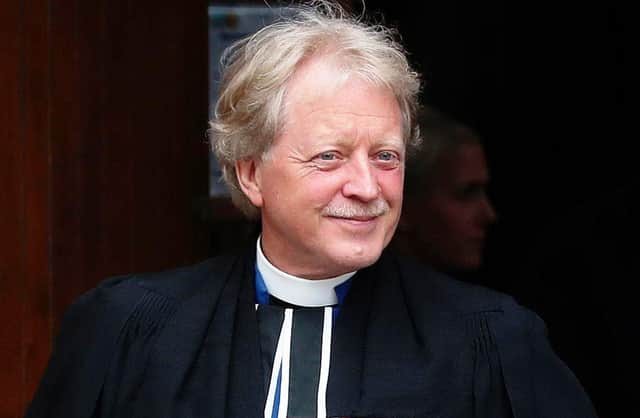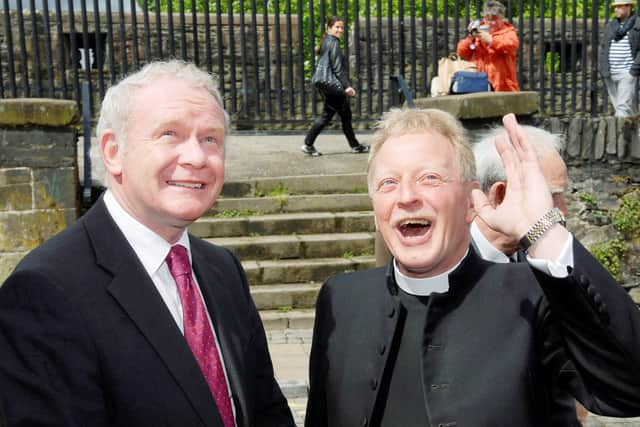To prematurely push towards a border poll would only add to existing divisions


Reflecting on Northern Ireland’s one-hundred-year story confirms the accuracy and appropriateness of some wise words once spoken by Nelson Mandela who said, “after climbing a great hill, one only finds there are many more hills to climb”, writes Rev. Dr. David Latimer.
Clearly this rings true for the people of Northern Ireland who, having endured three decades of inter-communal conflict, all too soon found themselves divided by the Brexit referendum result.
Advertisement
Hide AdAdvertisement
Hide AdThen there was the devastating invasion onto our shores of COVID-19, quickly followed by the messy out-workings of an EU exit strategy in the shape of an unsettling Irish Sea border.


As if all of this wasn’t enough, Northern Ireland now finds itself being bombarded by a chorus of voices calling for a border poll and the reunification of the island.
Someone once said: “It seems to be an ironic habit of man that, when he loses his way, he doubles his speed!”
Rushing to bring about change on complex constitutional issues, especially where there appears to be no meeting of minds, is a dangerously risky strategy. Indeed, to prematurely push towards a border poll would, I believe, add to existing divisions rather than diminish them.
Advertisement
Hide AdAdvertisement
Hide AdMore than ever, space and time are needed in Northern Ireland to permit all of us to learn to do what we don’t know how to do and that’s commit to a future of good relations marked by partnership and, even, trust and friendship.
A most unhelpful Brexit outcome, particularly for Northern Ireland, has undoubtedly accelerated the prospect of a border referendum. But not for everybody. Unionists, who, by and large, believe Northern Ireland was set in stone as a political reality in 1921, continue to have no appetite for change - something which should not be dismissed by those nationalists who so desperately desire Irish unity.
Former Ulster Unionist leader David Trimble, when asked back in 1988 what he really wanted for unionists, simply responded, “to be left alone!”. If truth be told, this would be the response with which most Unionists would be happiest in 2021.
Demographic surveys may be showing that Protestants in Northern Ireland are ‘old and shrinking’ and Catholics ‘young and expanding.’ Nonetheless, the old assumption that all Catholics support reunification and all Protestants slavishly support the Union no longer holds true. The reality today is much more nuanced, making a constitutional settlement anything but a done deal.
Advertisement
Hide AdAdvertisement
Hide AdCognizant that issues such as a border poll and a united Ireland are largely political issues should never be allowed to disguise the economic implications of constitutional change. One report by Trinity College academics, for example, suggests there will be no reunification without economic consequences. Another report states that unification would cause a dramatic fall in living standards right across the island of Ireland and require a hike in taxes.
This roughly corresponds to what happened in Germany at the start of the 1990s. Despite Prime Minister de Maizière’s promise that ‘no-one will be worse off than before and many will be better off’, a solidarity tax, set at 7.5%, was needed to cover the crippling cost of unification.
Thirty years later, not one of the 30 companies listed on the German Stock Exchange has its headquarters in the East. The elites of a united Germany - those in business, education and politics - still mostly come from the West.
Also, alarmingly, 57% of Eastern residents still feel like second class citizens. Undeniably, German reunification has fallen short of creating a country flowing with milk and honey for everyone.
Advertisement
Hide AdAdvertisement
Hide AdUnquestionably, the path to bringing about constitutional change on the island of Ireland will be anything but straightforward. In all likelihood, the process will take decades and cost far more than anyone might imagine. Moreover, the risk of a return to violence along the way cannot be ruled out.
Truly, a lot has happened in the last 100 years. The 2:1 ratio of Protestants to Catholics, after partition, has virtually become an equal balance of populations on the demographic seesaw. A strong wind of change is blowing. That said, any temptation to settle for an on-the-spot solution to the border must be resisted.
Nothing raises the political temperature faster and higher than “quick-fix”, poorly researched and hastily considered remedies. Consequently, the unwelcome outworkings of Brexit, COVID 19, or, for that matter, Scottish politicians’ independence obsession should not be used to speed up the journey to Irish unity.
The people of Northern Ireland are the ones who will, ultimately, determine their destiny. Since there is more than one path to the top of a hill, the task in hand must be to find the right path and achieve the outcome that will be acceptable and work for everyone. The better angels of our nature can yet shine through.
○ Rev. David Latimer is retired minister of First Derry Presbyterian Church.